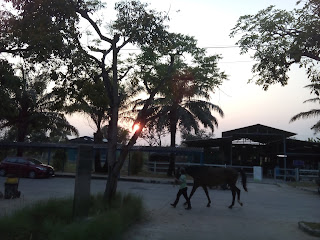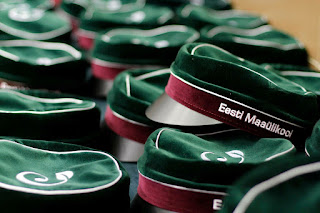Of food and trust (and other stuff)
 |
| Sunset at Mahanakorn University of Technology |
The „bring
your own“-concept works well in Thailand. While I often have to get into
discussions about hygiene regulations when I hand over my cloth bag for bread
or my own lunch box in Germany, here, nobody refuses. Only my insulated ice tea
mug was rejected once. People make look at me strangely if I refuse the extra
plastic bag (“Seriously, you brought your own?” - Thailand loves plastic,
really) or drink something without a straw. Bew, the owner of the best
coffeshop on the Mahanakorn University’s campus, who knows the names of all of
his customers, also knows my quirks: own bamboo straw, own reusable cup, not
milk, but brings coconut milk. He finds this a bit strange, coconut milk is
meant for cooking, not for milk tea, but he’ll keep it in his fridge for me. I
have become quite addicted to iced green milk tea and also the “Cha Thai”, the
Thai milk tea that is artificially colored red. Most of the coffeshops don’t
have vegan milk alternatives, but they all accept it if I bring it myself.
Sometimes that will make the drink cheaper, but not always.
The lady at
the Trat bus terminal also first said she couldn’t make me the tea with soy
milk, until I bought it myself next door and brought it back to her. Shortly
after that, I’m in the minivan back to Bangkok – well, almost Bangkok, for the
university where I do my placement is located a bit outside of the city, in
Nong Chok. There’s thirteen passengers on the van, bags between our knees, and
we make a lot of random stops. Sometimes we get off, some people get snacks,
sometimes only the driver gets off, sometimes we just stop, wait, and drive on.
It is one of these stops, I’m waiting for the others to buy their chips and
water and get back in, so I can go back to my seat just by the door, when
suddenly the door closes and the van takes off. I panic, my backpack with phone
and wallet is on my seat. Without my phone I can’t even use the translation app
to ask the other passengers what’s going on. None of them speaks any English.
One of them gestures me to get some food and sit down, and I soon calm down and
understand that the van is going to come back. Everyone’s luggage is inside and
we were not just abandoned halfway to Bangkok. So I sit down, lower my
respiratory rate and have some food. The man who made me sit down eventually
has to pay for the food, for of course my money is on the bus. I can’t explain,
but he understands it anyway. When the van comes back, he doesn’t even want his
twenty baht back.
I generally
have great trust in people and always assume that they only want you good. The
Thai people keep reassuring me in this.
My contact
person at the university, Trust, has already organized everything for me. When
I reach Nong Chok, Baiyok, another vet student is waiting for me with the key
to my dorm room, and she shows me where to find all the important things:
washing machines, the store to buy scrub suits, the supermarket, and the market
for fresh produce. Trust picks me up half way to the Faculty of Veterinary
Medicine the next morning to give me a quick tour of the campus. This will be
my home for the next two weeks – or three months, depending on the point of
view, for not all of the departments I’ll be working in are located in this
suburb.
First, I am
shown around the small animal clinic, I’m not sure why, as I won’t be here at
all. “This is Ina from Germany”, Trust introduces me, and the intern simply
replies “I know.” Now she is confused, haven’t I just arrived last night? Well,
almost all of the small animal clinic’s staff remembers me from the karaoke bar
two weeks ago. I, on the other hand, can’t remember their names. I’m having a
hard time with Thai names, I have not yet gotten the hang of their sound.
Everyone has a short nickname, but the nametags (if I am able to read them) and
the Facebook names are normally the full name, and the nickname can’t usually
be guessed from that. So for now, the only name I know in the large animal
hospital is my supervisor Dr. Pui, and then I learn the names one by one. Many
of the vets work with exotics, ruminants and horses, but the students rotate
through the clinics in a monthly rhythm in groups of ten to fourteen people. As
I am following the action and not just one species, I get in contact with three
groups: ruminants, equine, and obstetrics. Already on my first day, I am invited
to dinner by some of the students, and I love the little restaurant near the
dorm so much that I go there almost every day. Kade, the owner, remembers me
and my weird habits quickly: no meat, no fish sauce, and no milk in the green
tea. She makes up vegan versions of her most popular dishes, for example deep
fried mushrooms instead of chicken.
When I
order my tea at Bew’s, he always send me away, sometimes he has such a long
list of orders that it will take half an hour or more until he puts my drink on
the counter. The same goes for the canteen: You order, then leave and come back
after a couple of minutes. When I wait too close by, I will be eyed
suspiciously and told a couple of times that it will take a minute. So I can go
back to the patient and pick my tea up later. I’m not sure I could do this in
Germany. If they saw me walk away they probably wouldn’t make me anything. But
then again, all of this takes place pretty much outdoors. I can see Bew’s
counter from the bovine clinic.
The
students leave their bags with valuables openly in the clinic, too. But with
time, I come to understand that not everyone trusts everybody. At first I think
everybody is just being nice and they don’t want me to feel lonely – somebody
is always accompanying me home, and Dr. Pui drives me home if it’s already dark
when we finish work and always makes sure I get something to eat before she
drops me off at the dorm. It would actually be faster to walk, it really is a
short way from the clinic to the dorm, and with the car you have to make two
U-turns. After Bas and his girlfriend Phon have taken me out to dinner, they
also insist on driving me home. “It’s a five minute walk! Don’t bother,
really”, I protest.
“It’s
dangerous”, Bas says. “All the foreigners, from Myanmar, mainly. And your
dormitory isn’t as safe as ours, your main entrance is always open! My brother
wants me to keep a gun in the car for my safety.”
Wow.
Somebody’s afraid of foreigners! Not me though, as it seems, as they take me to
have dinner with them twice.
 |
| Not really a lot of choices for vegans |
The Thai
are very proud of the food and I can’t count the times I was told that I’d be
missing a lot by being vegan. But the students become creative, whenever they
find something vegan, they bring it to me to try, they discuss which dishes
might work without meat… deep-fried seaweed, bubble tea without the milk, noodle
soup, and of course, sticky rice with mango. Moss, with whom I talked about
food a lot, actually gets me a plate of this dish and brings it to me for
lunch. The staff at the clinic lets me try raw mango with chili sauce. And although
three people have by now written down “no meat, no egg, no fish sauce” in Thai
for me, I never use these notes, as somebody is always ordering for me and
explaining it to the cook. Or Kade has created something for me. Today, for example,
she made me coconut and galangal soup that she gave me in my own lunchbox at
ten to nine, so that I could have it for lunch. Officially, the restaurant
opens at eleven.
 |
| Garlic at night... |
Ae, Mimi
and the other students from the equine clinic are always amused when they watch
me eat. Not only do I refill my own water bottle all the time, I bring my own
straw, too, and then I eat these weird combinations of rice and vegetables
without meat… I’m such an odd fish!






Kommentare
Kommentar veröffentlichen